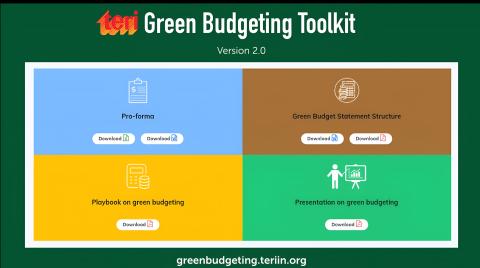TERI Unveils Green Budgeting Toolkit 2.0 to Power Greener Public Finance and Drive the Green Economy

New Delhi, September 24, 2025: Public finance plays a pivotal role in shaping environmental sustainability, as decisions on revenue and expenditure can leave lasting ecological footprints. Recognising this, The Energy and Resources Institute (TERI) today organised a national webinar and launched Version 2.0 of the Green Budgeting Toolkit, along with an online portal, to help governments, academia, and civil society systematically integrate environmental concerns into fiscal planning. The webinar drew registrations from more than 50 countries and participation of stakeholders from Bihar, Assam, Puducherry, and Tamil Nadu.
TERI launches Green Budgeting Playbook to Align India’s Fiscal Policy with Climate Goals
The updated Toolkit provides practical, ready-to-use instruments such as a pro-forma for departmental self-assessment, a Green Budget Statement structure, presentation, and primer and playbook. The toolkit can be accessed from here. By linking green public finance with the broader vision of a green economy, the initiative provides practical tools to strengthen fiscal sustainability, transparency, and accountability.
Launched at a time when India and the global community are aligning fiscal policies with sustainability goals, the toolkit builds on India’s legacy of issue-based budgeting, including gender budgeting (Statement 13) and child budgeting (Statement 12). As green budgeting is still evolving, the updated toolkit provides both conceptual clarity and ready-to-use instruments to embed sustainability in public financial management.
Emphasising the role of fiscal policy in driving sustainability, Dr Prodipto Ghosh, Distinguished Fellow, TERI, in his opening remarks noted, “Public budget in most states and countries is the largest source of expenditure in the economy. The purpose of the webinar is to heighten awareness of green budgeting and stimulate more thought and action.”
Dr Shailly Kedia, Senior Fellow, TERI, emphasised that green budgeting is not about reinventing the wheel, “Green budgeting is a self-assessment tool which helps in understanding who spends money on what activities, how much, and for which environmental goals. Green budgeting can evolve to be aligned with outcome budgets. Based on experience at the sub-national level, union budget can have an environment or green budget.”
Mr K Kalamegam, Environmental Engineer, Department of Science, Technology and Environment (DSTE), Government of Puducherry, shared that Green budgeting has the potential to serve as a transformative framework by embedding environmental and climate considerations into government decisions, ensuring that every part of the budget is viewed through a climate lens to advance a sustainable future. Expressing optimism, he added that the newly launched toolkit will help demystify the process and enable more states to achieve their climate targets. Dr Sunil Kumar Gupta, Research Lead (Air Pollution and Climate Change), Centre for Studies on Environment and Climate (CSEC), ADRI, Patna, highlighted that green budgeting has provided a nudge to activities across sectors, particularly in agriculture, animal husbandry, fisheries, and solar rooftop initiatives. He expressed gratitude for TERI’s support in finalising the State’s Green Budgeting Manual, noting that the encouraging outcomes so far have prompted the government to significantly scale up its green budget.
The updated Toolkit and Playbook provide practical, ready-to-use instruments to mainstream sustainability in public finance. It includes a pro-forma for departmental self-assessment, a Green Budget Statement structure, a detailed playbook, presentation templates, and portal-based resources with case studies and global practices, making green budgeting accessible, replicable, and scalable across states, Union Territories, and at the national level.
Several states and Union Territories are already implementing green budgeting, demonstrating its potential. Bihar expanded its green budget more than 4.5 times between 2020–21 and 2025–26, with schemes tripling. Assam scaled up by 1.6 times in just two years, with the number of schemes rising nearly sixfold. Puducherry, the first Union Territory to adopt green budgeting, increased allocations by 3.6 times between 2022–23 and 2025–26. States such as Kerala, Meghalaya, Odisha, and Rajasthan have also introduced environment- or climate-focused budgeting exercises. Green budgeting is also gaining traction globally. France categorises by impact, Indonesia integrates climate, Philippines tags budgets, EU tracks climate funds.
Moving ahead, broader adoption across departments, innovation within existing schemes, and joint ownership by finance and environmental ministries will be crucial. Over time, green budgets could be tabled alongside state and Union Budgets, institutionalising accountability and aligning fiscal priorities with India’s sustainability and climate goals. By making visible the environmental dimensions of public expenditure green helps governments make informed decisions, align fiscal policy with sustainability, and accelerate the transition to a resilient green economy.
